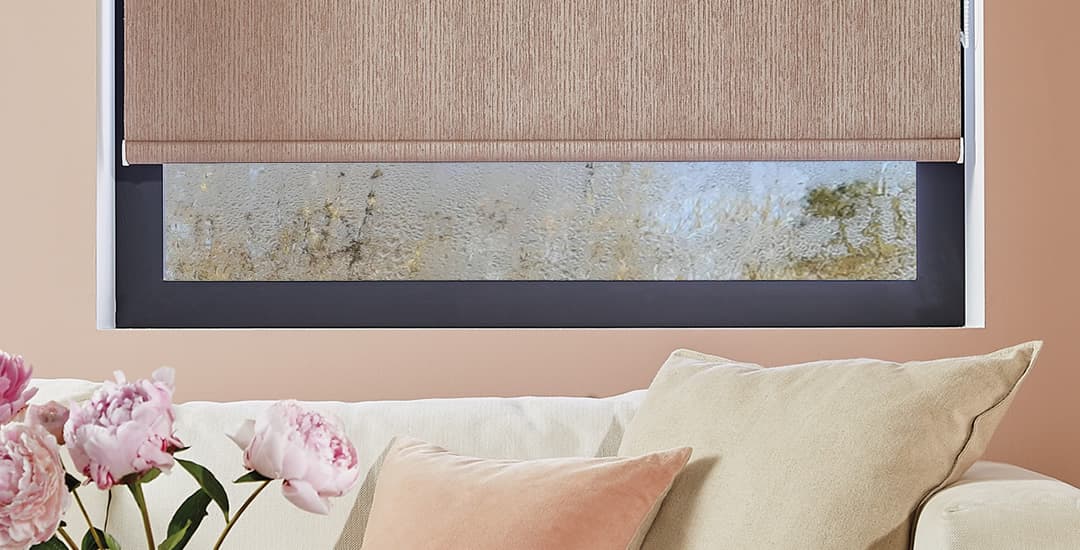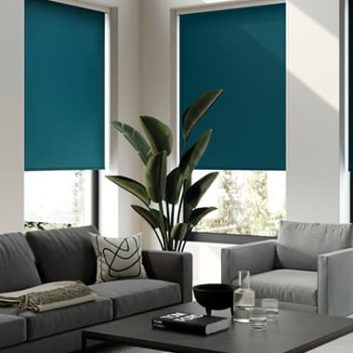
No, thermal blinds won’t stop condensation, unfortunately! Thermal blinds are designed to insulate your window, but they don’t address the things that cause condensation to develop, and nor can they help it to evaporate faster when it does develop.
However, because of the nature of condensation and the role that thermal blinds fulfil, your blinds might help to reduce the likelihood of condensation developing, or the degree to which it is present.
I’ll cover all of these things and explain more about condensation and blinds in this blog post.
Why does condensation form on window glass?
Condensation is the name for what happens when water vapour turns into liquid (water), and it’s the reverse of evaporation, which is when water turns into vapour (such as the steam from your kettle).
Both condensation and evaporation happen as a result of temperature changes and differences. We all know from high school science that water can be either a solid (ice), a liquid (water), or a gas (steam/vapour) depending on its temperature, and you get condensation on your windows because of the difference in temperature inside of your room versus the temperature outside, on the other side of the window.
Because the glass of your window is cool, and affected by the temperature outside, water vapour that forms around the inside of the window cools down in contact with this colder air, and turns back into liquid water droplets on the glass; condensation.
The greater the temperature difference between outside and the inside of the room (with outside being colder) the more condensation will form. This is why condensation is worse in winter than in summer.
The level of ventilation available to let water vapour escape from the room plays a part too of course, and we are far more likely to have windows open and good airflow in a room in summer as opposed to winter too.
Do thermal blinds stop condensation from forming on the window in the first place?

No, thermal blinds can’t stop condensation from forming. Thermal blinds are designed to provide a barrier between window draughts with its cold air from outside, and the interior of the room.
But thermal blinds don’t change the fact that the outside air comes into contact with the window itself, and the area between the window glass and the point at which the blind stops or reduces its presence in the room. Thermal blinds form a barrier on the inside of the room, but they don’t stop cold air from hitting and cooling the window glass itself.
Do thermal blinds stop condensation from lingering during the day?
No again; thermal blinds don’t help to stop condensation from lingering, or help condensation to evaporate. It is the temperature difference on the outside and the inside of the window glass, plus the level of ventilation in the room, that dictates if condensation forms in the first place, how much accumulates, and how long it lingers.
Getting rid of condensation on and around the window means ventilating and/or using a dehumidifier in the room or the area of the window to collect/remove condensation if it becomes a real problem.
Can thermal blinds reduce condensation build up?
Possibly. Whilst thermal blinds can’t stop condensation because they’re not designed for this and they’re not the type of product or material that can deal with condensation, thermal blinds could potentially reduce the likelihood of condensation build-up.
This is because a thermal blind insulates the window from the room; and so, whilst this should help to keep heat on the inside of the room and cold on the outside, it also serves to lower the difference in temperature between the are directly inside of the glass and the outside of it, and make this less acute.
The temperature between the window glass and the blind would tend to be noticeably lower than the temperature on the other side of the blind, within the room; whereas without the blind, this difference the closer to the window you get will be less acute and so, mean a greater temperature disparity between the outside of the glass and the inside.
That said, the effect of this in practice will rarely be dramatic, and you shouldn’t expect or rely on thermally insulating blinds to help with condensation in the home.
Thermally insulating blinds will help you to maintain a more stable room temperature and may cut your heating spend; but having a good seal between the window and the frame, choosing double glazed windows, having good ventilation, good airflow, and/or dehumidifiers, are the tools you need to tackle condensation.
It is also worth mentioning that things that generate water and vapour all obviously increase condensation too, unless you’ve got excellent ventilation/extraction systems in place to negate this.
This is why bathrooms and kitchens, being “wet” rooms, tend to suffer from condensation more acutely than other rooms. Even some forms of heating can generate a lot of water vapour and so, potentially condensation too; with gas fires and gas ovens/hobs being the greatest culprits, as they produce a moist heat.




